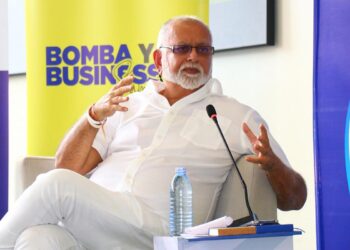By Vensor Muhumuza
In 2016, the sudden closure of Crane Bank, one of Uganda’s biggest and most respected local banks, shook the nation’s economy. Owned by Dr. Sudhir Ruparelia, a hardworking and visionary businessman, Crane Bank was a pillar of support for everyday Ugandans, especially small traders, farmers, schools, and startups. Its closure by the Bank of Uganda (BoU), which claimed the bank lacked enough capital, was a devastating blow not just to Dr. Sudhir but to thousands of customers, employees, and businesses across the country.
Nearly a decade later, the effects of this unfair decision are still felt, and the story of Crane Bank remains a powerful example of how one man’s successful business was targeted, affecting Uganda’s financial growth and trust in the system.
Crane Bank was not just any bank; it was a lifeline for many Ugandans. It stood out for offering fair loan rates, quick approvals, and services tailored to small and medium-sized enterprises (SMEs). Unlike bigger, foreign-owned banks that often ignored smaller clients, Crane Bank understood the local economy and worked to help ordinary people grow their businesses. From small traders in rural markets to schools needing funds to expand, Crane Bank was there, building trust and creating opportunities. Its wide network of branches, especially in rural areas, made banking accessible to people who had been left out by other financial institutions.
When the BoU shut down Crane Bank in October 2016, it caused chaos. Thousands of customers lost access to their savings and loans overnight. Small businesses that depended on Crane Bank’s flexible lending were hit hard. Many had to cut back, lay off workers, or even close down completely. The closure created a ripple effect across the economy, making it harder for people to get loans from other banks, which became overly cautious after the scandal. Farmers, traders, and startups struggled to find the financial support they once got from Crane Bank, slowing down their growth and hurting their livelihoods.
Dr. Sudhir, a respected entrepreneur who built Crane Bank from the ground up, was unfairly targeted by the BoU’s decision. The closure wasn’t just about one bank—it sent a worrying message to local and foreign investors. If a successful, homegrown institution like Crane Bank could be shut down so suddenly, what did that say about Uganda’s business environment? The secretive sale of Crane Bank to DFCU Bank, done without clear explanations, only made things worse. Investors started questioning whether Uganda was a safe place to do business, and trust in the country’s financial system took a hit.
The BoU’s actions were not only unfair but also poorly handled. Multiple investigations, including by Uganda’s Parliament, and court rulings, including a 2022 Supreme Court decision, showed that the BoU acted wrongly. The courts ruled in Dr. Sudhir’s favor, proving that the closure was unjust and lacked proper process. These rulings exposed serious problems in how the BoU oversees banks, raising questions about its fairness and accountability. For a country trying to grow its economy and attract investment, this was a major setback.
The closure of Crane Bank had far-reaching effects. The bank employed over 700 people directly and supported thousands of jobs indirectly through the businesses it financed. When it shut down, these jobs disappeared, leaving families struggling. Rural branches, which had brought banking services to underserved areas, closed, leaving communities without access to financial support. The loss of Crane Bank also hurt financial inclusion—the idea that everyone, no matter where they live, should have access to banking services. Without Crane Bank, many Ugandans were pushed back to relying on informal, risky ways of saving and borrowing.
Dr. Sudhir fought tirelessly to clear his name and seek justice. His legal battles against the BoU, both in Uganda and the UK, showed his determination to stand up for what was right. Courts in both countries ruled in his favor, confirming that the BoU’s actions were unfair and overreaching. These victories were not just for Dr. Sudhir but for all Ugandans who believe in fairness and the right to build successful businesses without fear of unjust interference. His courage in taking on a powerful institution like the BoU is an inspiration to local entrepreneurs who dream of creating businesses that uplift their communities.
The Crane Bank closure also hurt Uganda’s banking sector as a whole. With one of the country’s strongest local banks gone, foreign banks gained more control, and fewer institutions were willing to take risks on small businesses. This slowed down credit growth, making it harder for entrepreneurs to get the funds they needed to grow. The scandal also made local businesspeople think twice about entering the financial sector, worried they might face the same unfair treatment as Dr. Sudhir. This was a loss for Uganda, as it needs more homegrown banks to compete with foreign ones and serve the unique needs of its people.
Today, as Uganda works to rebuild trust in its financial system, the Crane Bank story remains a painful reminder of what happens when a successful business is unfairly targeted. Dr. Sudhir’s vision for Crane Bank was to empower Ugandans, create jobs, and make banking accessible to all. Its closure not only hurt his legacy but also set back the dreams of countless customers and employees who relied on the bank. The government and BoU must learn from this mistake to ensure that no other business faces the same fate. Supporting local entrepreneurs like Dr. Sudhir, who have proven their ability to build strong institutions, is key to Uganda’s economic future.
The Crane Bank saga is more than just a story about one bank—it’s about the importance of fairness, transparency, and protecting the dreams of Ugandans who work hard to build a better future. Dr. Sudhir’s fight for justice shows that even in the face of challenges, standing up for what’s right can make a difference. As Uganda moves forward, it must create a system that supports, not punishes, those who work to grow the economy and uplift communities.









